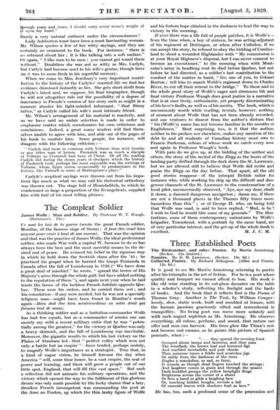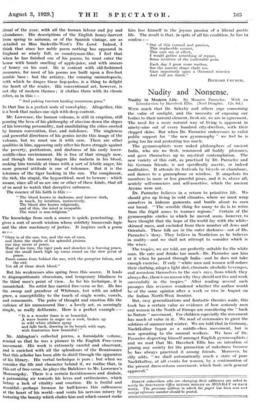Three Established Poets
Pansies. By D. H. Lawrence. (Seeker. 10s. 6d.)
IT is good to see Mr. Martin Armstrong returning to poetry after his triumphs in the art of fiction. For he is a poet whose quality and bouquet we cannot afford to lose. His work is
like old wine standing in its cut-glass decanter on the table in a scholar's study, reflecting the firelight and the backs of books. And the book that it reflects first is the Poems of Thomas Gray. Another is The Task, by William Cowper : lovely, slow, static work, built and moulded at leisure, with the human passions graciously sifted and remembered in tranquillity. No living poet can move more sedately and with such august repletion as Mr. Armstrong. He observes everything, all colour, perfume, and sound, that nature can offer and man can harvest. His lines glow like Titian's reds and browns and creams, as he paints this picture of Spanish peasants, when
". . . they spread the evening feast
Grouped about lamps and lanterns, and they pass The wmeflask, the brown loaf and honeyed figs And marbled mortadella and pale cheese.
Then someone tunes a fiddle and scratches jigs
Or softly from the darkness of the trees Jingles a mandoline, so sad, so faint, It sounds as though dead fingers touched the strings : And laughter comes in gusts and through the quaint Dark-huddled groups the yellow lamplight flings Brightneas across the corner of a shawl Or fires a hand or gilds a laughing face Or, touching hidden boughs, reveals a fall
Of emerald leaves with shadows frail as lace."
He has, too, such a profound sense of the procession and ritual of the year, with all the human labour and joy and abundance. His descriptions of the English honey-harvest
from spring to autumn, or of the Spanish vintage, are as detailed as Miss Sackville-West's The Land. Indeed, I think that since her noble poem nothing has appeared in England so wisely full, so countryman-like. I feel that when he has finished one of his poems, he must enter the house with hands smelling of apple-juice, and with smears of honey on his coat. He is content with old-fashioned measures, for most of his poems are built upon a five-foot iambic base : but the artistry, the cunning onomatopoeia, with which he drapes these hop-poles, is a thing to delight the heart of the reader. His conventional art, however, is not shy of modern themes ; it clothes them with its classic robes, as in this :— " And pulsing tractors hauling monstrous guns."
In that line is a perfect scale of vowel-play. Altogether, this is a book that makes one sigh with deep content.
Mr. Lawrence, the human volcano, is still in eruption, still pouring the lava of his philosophy of atavism down the slopes of his towering personality, and annihilating the cities erected by human convention, fear, and indolence. The singleness and powerful directness of his genius invite this image of the volcano, but we must use it with care. There are other qualities in him; appearing only after his fierce struggle against the poverty, puritanism, and drabness of his early lower- middle-class environment. He is free of that struggle now, and though the memory lingers like malaria in his blood, making him tremble at times with a sort of febrile anger, his more general attitude is one of tolerance. But it is the tolerance of the tiger basking in the sun. The complacent, the rich, the stupid, the hypocritical, need to beware : which means, since all of us are one or other of these kinds, that all of us need to watch that deceptive calmness.
The essence of his faith is this :—
" The blood knows in darkness, and forever dark,
in touch, by intuition, instinctively.
The blood also knows religiously, and of this, the mind is incapable.
The mind is non-religious."
The knowledge from such a source is quick, penetrating. It gives a sort of occult wisdom whose subtlety transcends logic and the slow machinery of justice. It inspires such a poem as :-
"Glory is of the sun, too, and the sun of suns,
and down the shafts of his splendid pinions run tiny rivers of peace.
Most of his time, the tiger pads and slouches in a burning peace.
And the small hawk high up turns round on the slow pivot of peace.
Peace comes from behind the sun, with the peregrine falcon, and the owl.
Yet all of these drink blood."
But his weaknesses also spring from this source. It leads to disproportionate obsessions, and temporary blindness to the third man's point of view. As for his technique, it is unmatched. No artist has carried free-verse so far. He has the sweep and grandeur of Whitman, but with an added grace, a susceptibility to the touch of single words, vowels, and consonants. The pulse of thought and emotion fills the cadence of his unmeasured line : a lovely art, so seemingly simple, so really deliberate. Here is a perfect example :-
" It is a wonder foam is so beautiful.
A wave bursts in anger on a rock, broken up in wild white sibilant spray and falls back, drawing in its breath with rage, with frustration how beautiful ! "
Mr. Aldington's collected poems, a formidable volume, remind us that he was a pioneer in the English Free-verse movement. His work is extremely careful and observant, and is enriched with all the splendours of the Renaissance that this scholar has been able to distil through the apparatus of his library. His verbal technique is pure ; but when we Consider -the life and character behind it, we realize that, in this art of free-verse, he plays the l3alakirev to Mr. Lawrence's Moussorgsky. There is a certain fastidiousness and disdain, a patronizing air towards his loves and enthusiaims, which betray a lack of vitality and emotion. He is fretful and resentful—perhaps because he half-knows this callousness at the heart of his world—and vents his nervous misery by torturing the beauty which eludes him and which cannot make
him lose himself in the joyous passion of a liberal poetic life. The result is that, in spite of all his erudition, he has to confess :—
" Out of this turmoil and passion, This implacable contest,
This vast sea of effort,
I would gather something of repose, Some intuition of the inalterable gods.
Each day I grow more restless, See the austere shape elude me, Gaze impotently upon a thousand miseries
And still am dumb."
RICHARD CHURCIT.



































 Previous page
Previous page